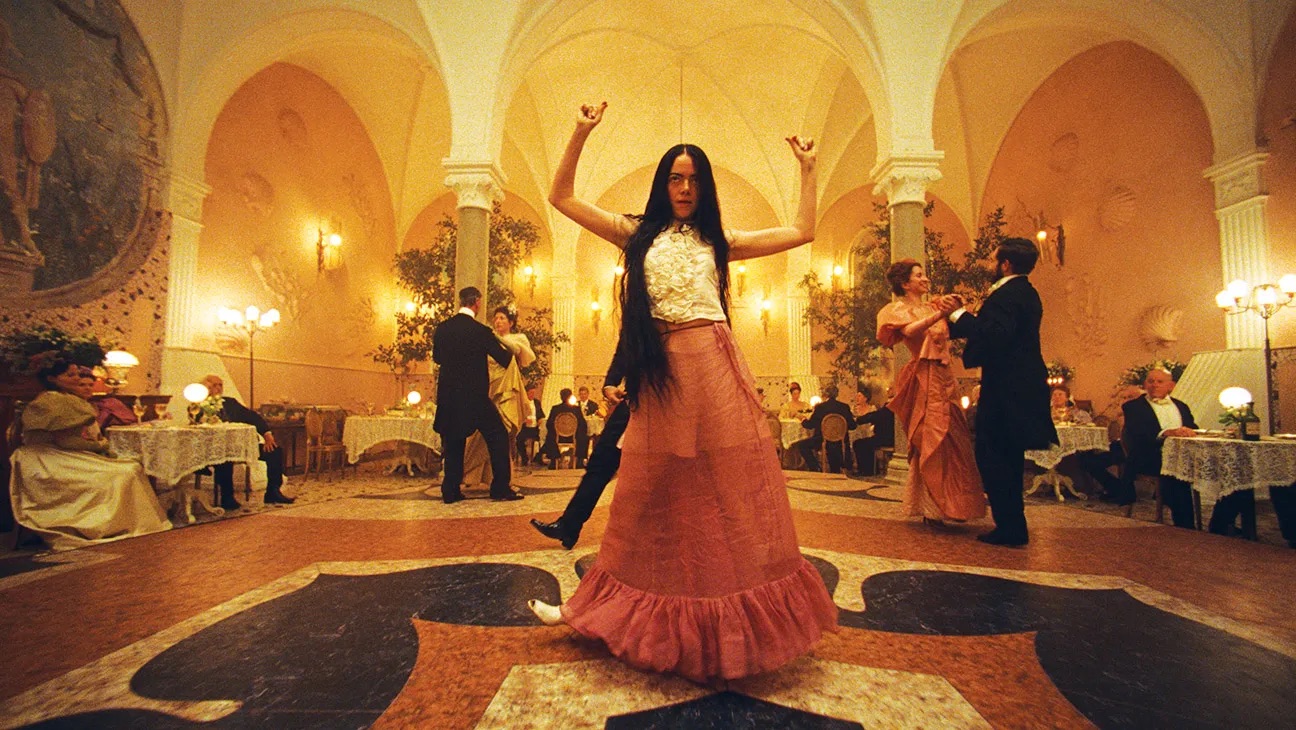Stabbing eyeballs, punching babies, and indulging in copious amounts of “furious jumping” are not what you would typically expect from a female protagonist. But in Yorgos Lanthimos’ “Poor Things,” Bella Baxter (Emma Stone) is not your average heroine.
Bella is differentiated from the conventional female archetype at the start of the film: distorted through a fisheye camera lens and painted amidst a strangely unsettling musical score — with notes plucked distinctly out of tune — she becomes incriminated as an outsider to normative 19th-century life. Introduced in ominous black and white hues (reminiscent of classic Universal monster films), she wanders the halls as an oddity hidden from public view. Revived from a suicidal death with the brain of her unborn infant child and the uncoordinated body of an adult woman, Bella is certainly a scientific anomaly. Bella may parallel Frankenstein’s socially-exiled Monster, but she is far from disfigured. Her beauty forms her into an object of desire for the film’s male characters, each fawning over her innocent perfection and attempting to entrap her at every turn — a reimagining of the infamous “Born Sexy Yesterday” science fiction trope, in which female characters are alienated by their naivety to social norms yet distinctly hypersexualized. However, despite her vulnerability as an infantilized woman and domesticated experiment, Bella finds strength in consistently breaking free from male confinement (and even clitoral castration). Leaving behind her father figure, endearingly and symbolically referred to as God (Willem Dafoe), Bella embarks on a global journey of self-discovery.
Disrupting the status quo, Bella’s unusual physical attributes and proclivity for unfiltered truth provide an avenue for female reconfiguration. Her body acts as a catalyst for questioning oppressive standards: she wears minimal makeup, dresses in mismatched, unconventional outfits that prioritize movement over aesthetics, and allows her long black hair to flow freely at knee-length. She continues to overturn social barriers through her improper behavior, openly discussing vulgar sexual topics which helps to normalize female sexuality, spitting out unwanted food, and acting according to her own liberated volition, declaring, “I must go punch that baby.”
Bella’s sexual freedom has been a point of contention in recent media discussions. Critics have deemed her portrayal in the film to be misogynistic, pandering to the objectifying male gaze. However, I argue that the intention is not to endorse the gender hierarchy, but rather to subvert and dismantle it. Emma Stone’s involvement as a producer for the film contextualizes its feminist goals from the outset. The sexual scenes are focused on Bella’s pleasure, which emphasizes her control over her own heroic journey. As the film turns from black and white to color, in the style of Dorothy discovering the unlimited landscapes of Oz, Bella proudly experiences her first sexual awakening as a new woman. The shots in this scene are framed to only show Bella, cutting her male partner from the picture entirely. Prioritizing choice and growth, she uses men for her own bodily exploration and refuses to conform to submissive female standards. Bella even chooses to enter into temporary prostitution in a French brothel to fulfill her erotic curiosities. Though common narratives surrounding sex work include the subordination of women, the brothel instead becomes Bella’s empowering domain. She claims men as her “own means of production,” devaluing them as tools for her feminist freedom.
To accentuate Bella’s power, her male counterparts are portrayed in an unflattering light with a ridiculous sense of hyper-masculinity. Duncan Wedderburn (Mark Ruffalo) epitomizes this over-the-top male ignorance. His constant empty threats of violence (ie. “I’ll beat the tar out of that guy”) and failed attempts to hold ownership over Bella satirize the male need for dominance. Though Wedderburn claims his role as a womanizer, Bella stands as an untameable hindrance to his misogynistic ways. In a scene in a Lisbon banquet hall, Bella dances freely to the beat of her own drum, moving her body without care. As Wedderburn chases her across the dance floor to engage in confined choreography, she casts him aside and centers herself in the middle of the shot as the sole subject of her own narrative. She insists upon liberation in all aspects of her life, not only breaking barriers but also managing to break the men who uphold these sexist structures.
Thwarting every instance of imprisonment, Bella makes a name for herself beyond her femininity alone. She constantly strives for upward mobility, turning even her entrapment on a cruise ship (depicted through forced perspective miniatures as a hopeless prison painted in darkened, dreary hues) into an opportunity for intellectual growth; the colors begin to brighten as she expands her philosophy, reads extensive works of literature, and forms her worldview with the belief that “once we know the world, the world is ours.” Bella’s speech evolves to reflect her advanced mental capabilities, and in the end, her ambitious strength is what separates her from a society seeking to minimize her role in the world. She leaves the brothel at her own will and determines “I will be a doctor,” a role widely reserved for men. Using the assured future tense, “will,” Bella displays her immense confidence in her own abilities and complete disregard for social limitations. She eventually settles into marriage once she is sure that Max McCandless (Ramy Youssef) will respect her intellectual and bodily autonomy: he holds the feminist perspective that “It is your body, Bella Baxter. Yours to give freely.” In a final subversion of gender roles, Bella asks for Max’s hand in marriage, ensuring that her freedom of choice remains the utmost priority.
Bella Baxter exists as a progressive symbol of female liberation. Free from gender and social constraints, she proves that those who blindly conform to polite society are the true “Poor Things.” Evolving into her own autonomous being and finding her place in the world’s unlimited possibilities, Bella creates a more viable way of existing as a woman. If you have yet to experience the stylistic tour de force that is “Poor Things” and Emma Stone’s Academy Award-winning performance, do yourself a favor and head over to Hulu to see Lanthimos’ magically real, feminist artistry for yourself.
Image courtesy of The Hollywood Reporter










Louis Allen • Apr 6, 2025 at 4:12 am
great article